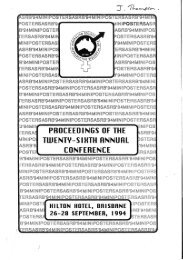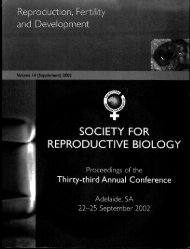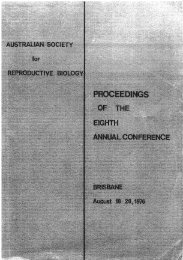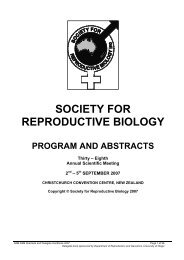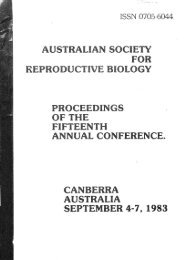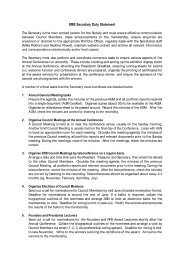N OCIETY' - the Society for Reproductive Biology
N OCIETY' - the Society for Reproductive Biology
N OCIETY' - the Society for Reproductive Biology
Create successful ePaper yourself
Turn your PDF publications into a flip-book with our unique Google optimized e-Paper software.
CYTOKINE NETWORKS IN THE ENDOMETRIUM AND OVARY DURINGEARLY PREGNANCYSarah A Robertson, Ph.D.Department of Obstetrics and Gynaecology and <strong>Reproductive</strong> Medicine Unit, The University of Adelaide,Adelaide SA 5005.C:':,;kines are clearly now identified as pivotal mediators of <strong>the</strong> dynamic and transient cell-cellc(,!nmunication events underpinning <strong>the</strong> growth, remodelling and demise so characteristic ofreproductive tract tissues. The intrinsic capacity of <strong>the</strong>se small glycoproteins to be producedtransiently, to act locally, and to be rapidly quenched is perfectly adapted to <strong>the</strong>ir roles as localmediators of endocrine hormone-governed cell proliferation, differentiation, activation and motility.\10st notably, cytokines regulate <strong>the</strong> interaction between somatic cells and infiltrating leukocytepopulations that are required to deal appropriately with <strong>the</strong> unique immunological challenges thataccompany ovulation, insemination, implantation and pregnancy.Our laboratory has focussed on <strong>the</strong> role of cytokines in endometrial biology, with a view toelucidating <strong>the</strong> cytokine pathways linking insemination with <strong>the</strong> cascade of molecular and cellularevents that culminate in implantation of <strong>the</strong> embryo. Our experiments in rodents and more recentlyin humans have demonstrated a role <strong>for</strong> seminal plamsa in 'priming' <strong>the</strong> female reproductive tract<strong>for</strong> successful implantation. Specific factors in seminal plasma including trans<strong>for</strong>ming growth factor(TGF)-~ stimulate uterine and cervical epi<strong>the</strong>lial cells to induce expression of an array of proinflammatorycytokines, which act subsequently to (1) initiate changes in <strong>the</strong> maternal immunecompartment facilitating induction of immunological tolerance to paternal transplantation antigens,and (2) promote <strong>the</strong> growth and development of <strong>the</strong> pre-implantation embryo.Complex cytokine networks also appear to operate in <strong>the</strong> ovary, most notably in regulating <strong>the</strong>trafficking and activation phenotype of myelQid leukocytes implicated in <strong>the</strong> tissue remodellingaccompanying ovulation and in <strong>the</strong> development, function and demise of <strong>the</strong> corpus luteum.CYTOKINE PRODUCTION AND ACTIONS IN HUMAN PREGNANCY AND PARTURITIONM.D. Mitchell and J.A. KeelanDept of Pharmacology and Clinical Pharmacology, University of Auckland, Private Bag 92019, Auckland,New ZealandThe importance of cytokines and modulation of immune cell function in successful pregnancy and parturitionhas become increasingly appreciated. The concept of pregnancy as a 'Th2 phenomenon', while not without itsflaws, provides a useful framework within which <strong>the</strong> roles and significance of cytokines in pregnancy can beinterpreted sensibly. The model views pregnancy as a condition requiring a bias towards humoral (T h 2)immunity and away from cell mediated (Thl) immunity: T h 2 cytokines (ie. ~-4, ~-10, TGF-(3) are viewed ashaving a protective role against <strong>the</strong> effects of pro-inflammatory (Thl-like) cytokines such as TNF-a, IL-l, ~2, rr...-6 and y-interferon, which are potentially harmful to placental (trophoblast) survival and pregnancymaintenance. The interesting dichotomy of this concept is <strong>the</strong> recognition that Thl cytokines are required <strong>for</strong>successful establishment of pregnancy. Many aspects of successful pregnancy can thus be viewed as a result ofa fine balance between <strong>the</strong>se two cytokine expression phenotypes. Conversely, several gestational pathologies(recurrent miscarriage, preeclampsia and preterm birth) have been found associated with a dominant Thlcytokine profile.Leukocytosis of <strong>the</strong> decidua and fetal membranes, accompanied by increased cytokine and eicosanoidproduction, is now known to be associated with preterm labour and delivery resulting from intrauterineinfection. Pro-inflammatory cytokines such as TNF-a (released from <strong>the</strong> membranes in response to infection)can act at multiple foci in <strong>the</strong> biosyn<strong>the</strong>tic pathway, exerting coordinated effects on intrauterine prostaglandinproduction. Enzymes involved in substrate release, conversion to active products, and inactivation throughmetabolism, are all targets <strong>for</strong> cytokine action. In addition, we have shown that at least one eicosanoid,thromboxane, is capable of stimulating cytokine production by amnion epi<strong>the</strong>lial cells, demonstrating <strong>the</strong>existence of a feed-<strong>for</strong>ward loop which may act to amplify <strong>the</strong> inflammatory cascade once initiated. Studieshave shown greatly elevated concentrations of cytokines (particularly amnion-derived cytokines, ~-6 and ~8) in amniotic fluid in pregnancies with confirmed chorioamnionitis, but also in preterm deliveries with nosigns of microbial invasion. Our studies of cytokine concentrations in amnion, choriodecidual and placentaltissues suggest that a large proportion of preterm deliveries are associated with increased cytokine productionin <strong>the</strong> membranes (but not placenta). We have interpreted this data as evidence of an inflammatory hyperresponsein <strong>the</strong> aetiology of a significant proportion of preterm deliveries.While Th2 cytokines might be expected to predominate during <strong>the</strong> majority of pregnancy, we postulated that aT h2 withdrawal could occur at time of delivery to allow <strong>the</strong> inflammatory processes of parturition to occurunhindered. Our recent data supports this hypo<strong>the</strong>sis, with findings of decreased ~-l0 production by <strong>the</strong>choriodecidua with normal term labour. More unexpected, however, was <strong>the</strong> finding that ~-10 exerted proinflammatoryeffects on <strong>the</strong> amnion at term, stimulating cytokine and prostaglandin production.-2 transcription in amnion.A better understanding of <strong>the</strong> precise roles of cytokine-mediated events during early pregnancy isnecessary to improve reproductive outcomes in humans and livestock or threatened species, whereimplantation failure is still <strong>the</strong> major cause of pregnancy loss.9091




